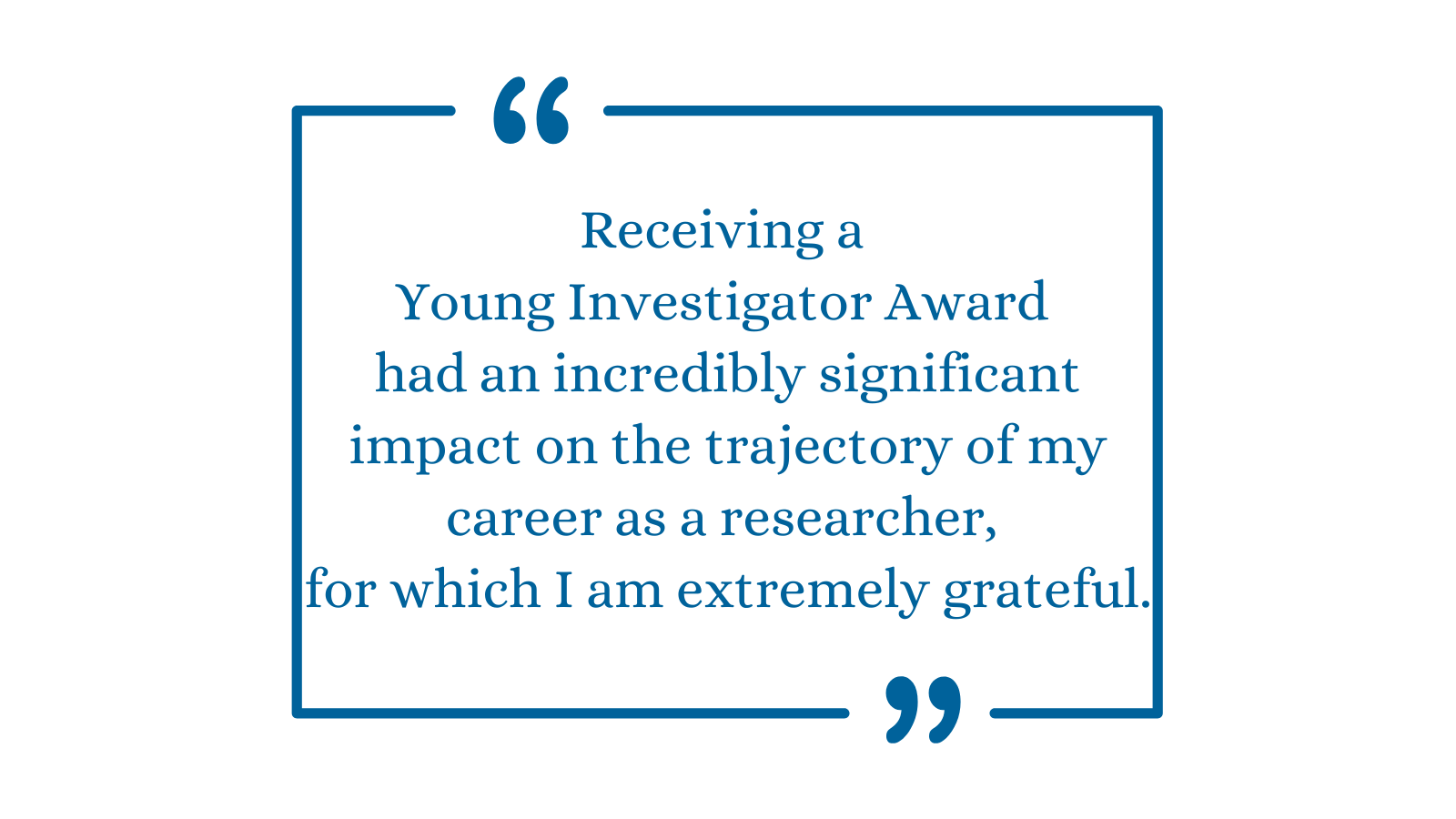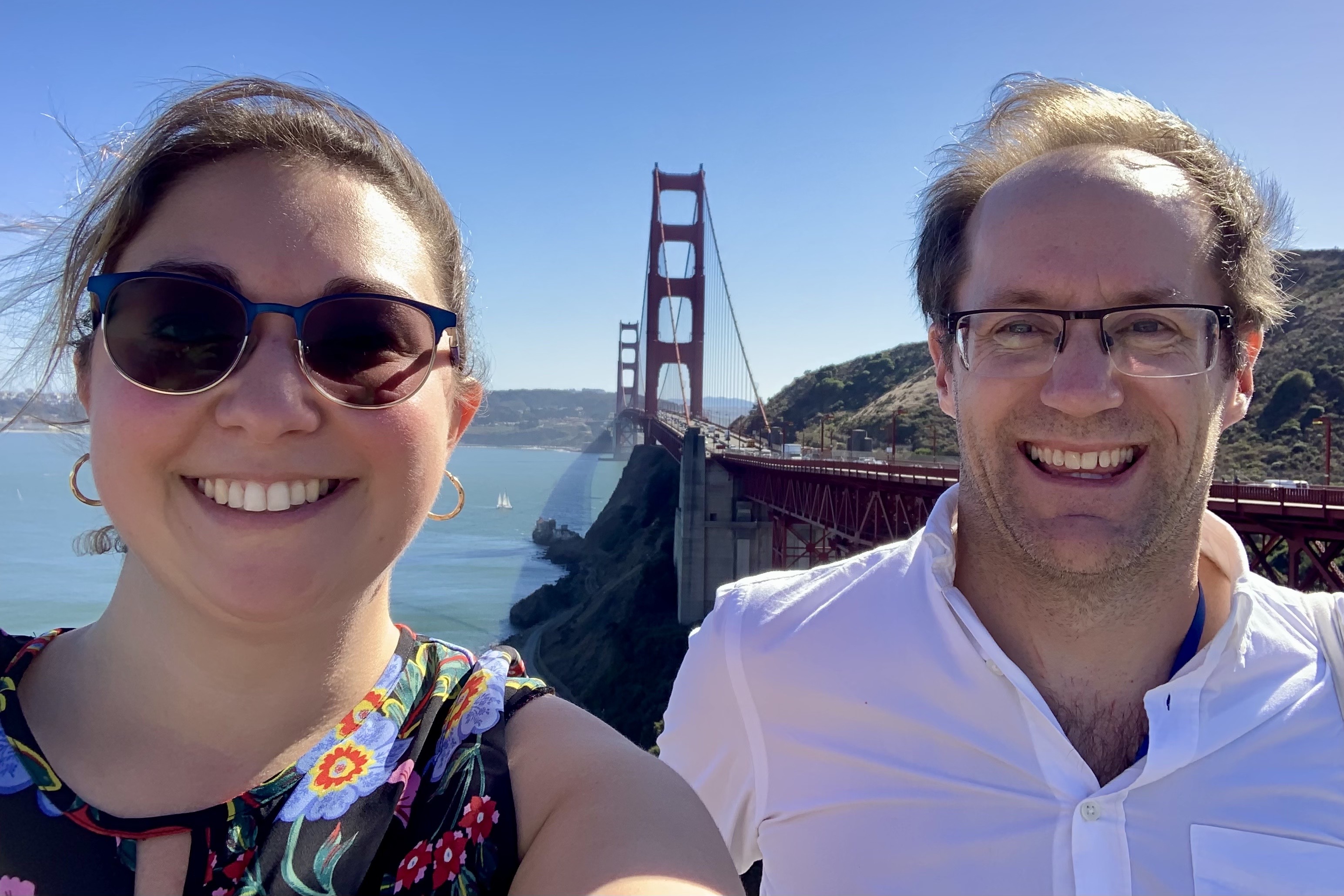Stephanie Bouley received a Young Investigator Award from the Children’s Tumor Foundation in 2016 and it changed the trajectory of her career. Here she shares her thoughts on the impact the award has had on her life, and why she remains committed to fighting NF.
I was first introduced to neurofibromatosis type 1 (NF1) in 2014 when I was a graduate student at Dartmouth College, pursuing a Ph.D. in experimental and molecular medicine. I am a first-generation college student and wanted to earn a doctorate working on a genetic condition with few therapeutic options due to my family’s personal experiences with rare disease. I was in the process of choosing a dissertation laboratory, and I had the opportunity to rotate in a lab headed by Dr. Yolanda Sanchez, which focused on synthetic lethal screening to identify new therapeutic molecules to treat NF1. The lab had discovered small molecules which were lethal when applied to NF1-deficient cells while having little effect of the growth of normal cells. However, the mechanism of action at the molecular and cellular level was unknown. I found this approach fascinating since my previous research experiences focused on using drugs with a known mechanism for a specific disease. I decided to join this lab, and I spent the next five years of my Ph.D. working to identify how our molecule of interest, called Y102, was able to selectively kill NF1-deficient cells.
 Two years into my Ph.D., I decided to apply for a Young Investigator Award to help support this endeavor. Our lab had previously been funded by the Children’s Tumor Foundation in the form of two other Young Investigator Awardees, and both of those lab members decided to remain in the NF1 field as a result. I was drawn to the complexities and struggles associated with treatment of NF1, and I was eager for the opportunity to become more integrated into the NF1 community. When I received this funding in 2016, it provided me with several opportunities to expand my research and my professional career. During the award period, I was able to perform a series of experiments to determine both the target and mechanism of action of Y102. Consequently, we applied for a patent for Y102, and the manuscript describing this work is in final revisions.
Two years into my Ph.D., I decided to apply for a Young Investigator Award to help support this endeavor. Our lab had previously been funded by the Children’s Tumor Foundation in the form of two other Young Investigator Awardees, and both of those lab members decided to remain in the NF1 field as a result. I was drawn to the complexities and struggles associated with treatment of NF1, and I was eager for the opportunity to become more integrated into the NF1 community. When I received this funding in 2016, it provided me with several opportunities to expand my research and my professional career. During the award period, I was able to perform a series of experiments to determine both the target and mechanism of action of Y102. Consequently, we applied for a patent for Y102, and the manuscript describing this work is in final revisions.
As part of the CTF Young Investigator Award, I had the opportunity to attend the annual NF Conference in Washington D.C. in 2017 and the Joint Global Neurofibromatosis Conference in Paris in 2018. Both meetings provided me with new insights and opportunities to establish myself in the NF community. In Washington D.C., I was able to learn about the different manifestations of NF1 other than neurofibromas and got exposure to researchers studying NF2 and schwannomatosis. This was also my first opportunity to meet NF patients, as well as researchers and clinicians focused on NF research other than those in my own lab. It was the first time I was able to begin to comprehend the vastness and uncertainties surrounding an NF1 diagnosis, and it reflected the issues members of my family faced, albeit not with NF.
 While at the NF Conference in 2018, I stumbled upon a group of fellow NF researchers in a Parisian café. I ended up joining them for dinner, and we spent the evening discussing our research. At the time, I was beginning to look for a post-doctoral research opportunities in the New England area and, as it turns out, one of my fellow diners, Dr. Jim Walker, was looking to hire a research fellow to join his lab at Massachusetts General Hospital (MGH) in Boston. By the end of the evening, Jim invited me to interview for a position. I completed my Ph.D. at Dartmouth in May 2019 and joined the Walker Lab at MGH that July. Without the networking opportunities while attending the NF Conference, made possible through the support of CTF, this fortuitous meeting with my current research mentor would not have taken place.
While at the NF Conference in 2018, I stumbled upon a group of fellow NF researchers in a Parisian café. I ended up joining them for dinner, and we spent the evening discussing our research. At the time, I was beginning to look for a post-doctoral research opportunities in the New England area and, as it turns out, one of my fellow diners, Dr. Jim Walker, was looking to hire a research fellow to join his lab at Massachusetts General Hospital (MGH) in Boston. By the end of the evening, Jim invited me to interview for a position. I completed my Ph.D. at Dartmouth in May 2019 and joined the Walker Lab at MGH that July. Without the networking opportunities while attending the NF Conference, made possible through the support of CTF, this fortuitous meeting with my current research mentor would not have taken place.
These experiences all contributed to solidifying my commitment to help ending NF. As a post-doctoral research fellow in the Walker Lab, my current research uses several strategies to develop treatments for NF1. These include identifying novel therapeutic targets for treating neurofibromas, gene therapy to correct pathogenic NF1 mutations, and investigating the link between NF1, pain, and sleep through a sleep study. I consider myself to be extremely fortunate to be part of an institution where many researchers and clinicians are also working on NF. We have benefited from funding from the CTF, NTAP, Boston Children’s Hospital, and the Gilbert Family Foundation. Outside of the lab, I have also been continuing my involvement with the NF community through the CTF NF Summit and the local foundation, Neurofibromatosis Northeast. I plan to continue to work on NF1 beyond my current training to help patients and families affected by NF1. Overall, receiving a Young Investigator Award had an incredibly significant impact on the trajectory of my career as a researcher for which I am extremely grateful.
Click here to learn about current funding opportunities from the Children’s Tumor Foundation.

